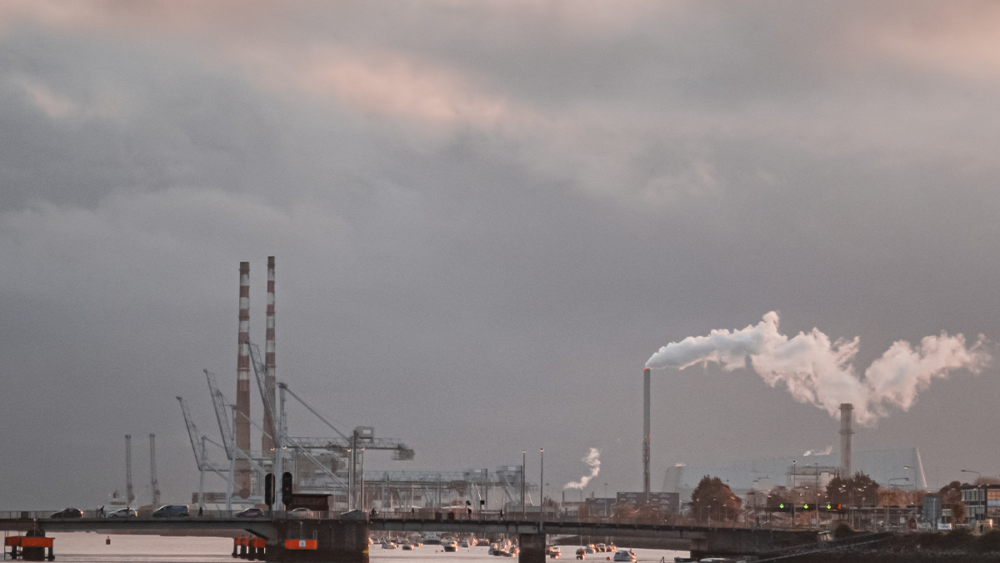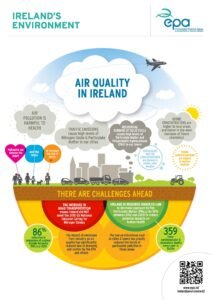Air pollution is more lethal than you think

Air pollution from fine airborne particles is responsible for around 725 deaths in Dublin and around 1,300 nationally every year, according to research. A study published by the Environmental Protection Agency estimates that the number of expected deaths in the city from pollution from diesel vehicles alone could be up to 144 per annum. Most of the deaths will result from either cardiopulmonary disease or lung cancer.
It based its findings on an analysis of the level of particulate matter (PM2.5) – aerosol particles which can affect the heart and lungs – found in the capital. Studies have estimated the impact of all PM2.5 could result in 25 disability-adjusted life years which measures the total number of years lost to a combination of illness, disability and premature death, while the impact of PM2.5 from diesel vehicles alone was just over 5 years.
- The shocking environmental truth of commercial holidays
- The environmental impact of single use masks
Ireland’s air quality currently is considered good, relative to other European Union (EU) Member States; however local issues do exist. Maintaining this standard is a growing challenge. Despite our monitored air quality generally being within EU limit values, the level of particulate matter and air pollution is of growing concern, especially during the winter months when domestic solid fuel burning can directly impact on air quality and on our health. In our larger urban areas we face potential breaches of the EU limit for nitrogen dioxide, as occurred at St. John’s Road West in 2019, unless we reduce our dependence on the private motor car.

The European Environment Agency (EEA) estimates show that more than 400,000 premature deaths are attributable to poor air quality in Europe annually. In Ireland, the number of premature deaths attributable to air pollution is estimated at 1,300 people. The WHO has described air pollution as the ‘single biggest environmental health risk’ in the EU.
The ambient air quality pollutants of most concern on an EU-wide level are nitrogen dioxide, particulate matter (PM), ozone, and PAHs. They can impact on human health, ecosystems, and vegetation; and monitoring is carried out to determine their concentration levels.
The gases that cause the most air pollution are Nitrogen oxide (NOx), Volatile Organic Compounds (VOC), Carbon dioxide (CO2), Sulphur oxide (SOx), dioxines and furans.
Nitrogen oxide (NOx) is produced from the reaction of nitrogen and oxygen during combustion at high temperatures. They are typically found in areas with heavy traffic, such as large cities.
Volatile Organic Compounds (VOC) are organic chemicals that have a high vapor pressure at ordinary room temperature. Examples of VOC are Methane (CH4), Hydrocarbons, Chlorofluorocarbons, etc. and are generated in large quantities mostly during industrial production processes when alcohols, paints and solvents are applied.
Carbon dioxide comes from various types of combustion in industrial and domestic environments, from power plants and transport.
Sulphur oxides, such as Sulphur dioxide (SO2) and Sulphur trioxide (SO3). Sulphur Dioxide is produced from the combustion of coal or oil. SO3 is generated from SO2, with Sulphur trioxide being the cause of acid rain.
Dioxins and furans are common names for toxic chemicals that are found in small amounts in the environment, including air, soil and water. The largest source of dioxins and furans is usually the burning of municipal and medical waste, although other major sources include fuel burning and electrical power generation.
In the wake of such studies, the government has been working to impose a ban on the burning of smoky coal by home-owners and to prepare strict new regulations on the burning of all other solid fuels, especially so-called “wet wood”. One example of a measure that could be taken is to introduce a maximum moisture content level at which wood can be sold. Wood with high moisture content (wet wood) is significantly more polluting than wood with low moisture content (dry wood).
In February, Minister for Environment, Climate and Communications Eamon Ryan launched a public consultation to seek views on the further regulation of solid fuel use for domestic home heating, and is inviting the public, health professionals, other experts, NGOs, and those involved in the industry to give their views on how Ireland can design and implement rules that will save lives.